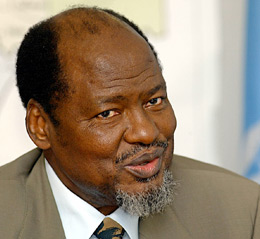About Joaquim Chissano
 Joaquim Alberto Chissano served as the second president of Mozambique for 19 years, from November 1986 until February 2005. He currently is the chairperson of the Joaquim Chissano Foundation, a nonprofit organization dedicated to the promotion of peace, economic development and Mozambican culture, and of the African Forum of Former African Heads of State and Government.
Joaquim Alberto Chissano served as the second president of Mozambique for 19 years, from November 1986 until February 2005. He currently is the chairperson of the Joaquim Chissano Foundation, a nonprofit organization dedicated to the promotion of peace, economic development and Mozambican culture, and of the African Forum of Former African Heads of State and Government.
Born in 1939, in Malehice – Gaza province of Mozambique, Joaquim Chissano was politically active as a young man in his native Mozambique, a Portuguese colony at the time. He went to Portugal to study medicine in 1961, but was forced to flee because of his political affiliations and sought refuge in France. In 1962, he traveled to Tanzania and became a founding member of the Mozambique Liberation Front (FRELIMO). Mr. Chissano played a fundamental role in the 1974 negotiations on the independence of Mozambique between FRELIMO and the Portuguese Government, taking office as prime minister of the transitional government. When Mozambique became independent in 1975, Joaquim Chissano was appointed Minister of Foreign Affairs. With the tragic death of President Samora Machel in 1986, Mr. Chissano was elected by the 130-member Central Committee of FRELIMO to succeed Machel as president of the party, head of state, and commander-in-chief of the armed forces.
He led positive socio-economic reforms, culminating with the adoption of the 1990 constitution that led Mozambique to the multi-party system and to an open market. He successfully negotiated a reduction in Mozambique's debt repayments and oversaw reforms that have led to sustained economic growth. During President Chissano's time in office, Mozambique began the journey of reconstruction and development, with improvements in health care, increased access to education and greater empowerment of women. In 1992, President Chissano helped to end Mozambique's 16-year civil war and reconcile a divided nation, negotiating peace with the RENAMO (Resistência Nacional Moçambicana) rebel group. In 1994, he won the first multi-party elections in the history of the country and was re-elected President of the Republic in 1999. President Chissano chose not to run for a third term in the 2004 presidential elections and left office at the end of his term in February 2005.
In December 2006, the United Nations Secretary-General Kofi Annan appointed Chissano the Special Envoy of the Secretary-General to Northern Uganda and Southern Sudan, in an effort to bring about a peaceful solution to the ongoing conflict with the Lord's Resistance Army (LRA).
At a ceremony in London on Oct. 22, 2007, Chissano's 68th birthday, former UN Secretary-General Kofi Annan announced that Chissano had been awarded the inaugural $5 million Prize for Achievement in African Leadership awarded by the Mo Ibrahim Foundation and given to a former African leader who has shown good governance. Intended to be awarded annually by the Mo Ibrahim Foundation, the prize of $5 million dollars is spread over the course of 10 years, plus $200,000 per annum subsequently.
Mr. Chissano occupied high posts in several other international organizations, including chairperson of the Community of Portuguese Speaking Countries; chairperson of the Southern African Development Community; chairperson of the SADC Organ for Cooperation in the fields of Politics, Defense and Security; and chairperson of the African Union. He is a member of the Club of Madrid, The Hunger Project and the Nelson Mandela Institution.